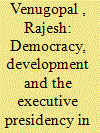|
|
|
Sort Order |
|
|
|
Items / Page
|
|
|
|
|
|
|
| Srl | Item |
| 1 |
ID:
139016


|
|
|
|
|
| Summary/Abstract |
This paper examines the developmental causes and consequences of the shift from a parliamentary to a semi-presidential system in Sri Lanka in 1978, examining its provenance, rationale and unfolding trajectory. Drawing on a wide range of sources, it sets out an argument that the executive presidency was born out of an elite impulse to create a more stable, centralised political structure to resist the welfarist electoral pressures that had taken hold in the post-independence period, and to pursue a market-driven model of economic growth. This strategy succeeded in its early years, 1978–93, when presidents retained legislative control, maintained a strong personal commitment to market reforms and cultivated alternative sources of legitimacy. In the absence of these factors, the presidency slipped into crisis from 1994–2004 as resistance to elite-led projects of state reform mounted and as the president lost control of the legislature. Between 2005–14, the presidency regained its power, but at the cost of abandoning its original rationale and function as a means to recalibrate the elite–mass power relationship to facilitate elite-led reform agendas.
|
|
|
|
|
|
|
|
|
|
|
|
|
|
|
|
| 2 |
ID:
051561


|
|
|
| 3 |
ID:
193268


|
|
|
|
|
| Summary/Abstract |
The new modernization theory has suggested that the pervasiveness of traditional values has a clear impact on the quality of democratic governance. In this contribution to this special issue on the political consequences of traditional beliefs, we explore whether and to what extent the pervasiveness of traditional values and beliefs has a detectable impact on authoritarian attitudes. Specifically, we analyze the relationship between the support for a “strongman” and the acceptability of traditional practices for Muslim respondents from 27 jurisdictions. The results suggest that those who believe that traditional practices, such as the use of sorcery, appealing to jinn, and to the souls of ancestors, are acceptable under Islam are more likely to prefer a strongman to democracy. Notably, we found that respondents’ religiosity does not significantly affect their support for a strongman, raising questions about how accurately traditionality has been measured so far.
|
|
|
|
|
|
|
|
|
|
|
|
|
|
|
|
|
|
|
|
|